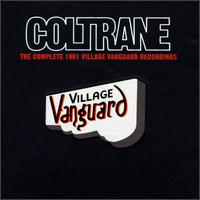
John William Coltrane was an American jazz saxophonist, bandleader and composer. He is among the most influential and acclaimed figures in the history of jazz and 20th-century music.
Modal jazz is jazz that makes use of musical modes, often modulating among them to accompany the chords instead of relying on one tonal center used across the piece.

James Emory Garrison was an American jazz double bassist. He is best remembered for his association with John Coltrane from 1961 to 1967.

Impulse! Records is an American jazz record label established by Creed Taylor in 1960. John Coltrane was among Impulse!'s earliest signings. Thanks to consistent sales and positive critiques of his recordings, the label came to be known as "the house that Trane built".
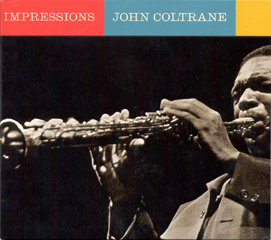
Impressions is an album of live and studio recordings by the jazz musician and composer John Coltrane. It was released through Impulse! Records in July 1963.
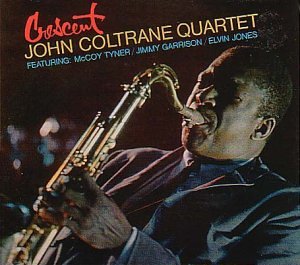
Crescent is a studio album by the jazz musician and composer John Coltrane. It was released in July 1964 through the label Impulse!. Alongside Coltrane on tenor saxophone, the album features McCoy Tyner (piano), Jimmy Garrison and Elvin Jones (drums) playing original Coltrane compositions.

Olé Coltrane is a studio album by the jazz musician and composer John Coltrane. It was released in November 1961 through Atlantic Records. The album was recorded at A&R Studios in New York, and was the last of Coltrane's Atlantic albums to be made under his own supervision.

Africa/Brass is a studio album by the jazz saxophonist and composer John Coltrane. It was released on September 1, 1961 through Impulse! Records. Coltrane's working quartet is augmented by a larger ensemble that brings the total to twenty-one musicians. Its big band sound, with the unusual instrumentation of French horns and euphonium, presented music very different from anything that had been associated with Coltrane to date. While critics originally gave it poor ratings, more recent jazz commentators have described it as "amazing" and as a "key work in understanding the path that John Coltrane's music took in its final phases." It is Coltrane's first release for Impulse!.

John Coltrane and Johnny Hartman is a studio album by John Coltrane and Johnny Hartman which was released by Impulse! Records in July or August 1963. It was inducted into the Grammy Hall of Fame in 2013.

The Heavyweight Champion: The Complete Atlantic Recordings is a 1995 box set by jazz musician John Coltrane. It features all of the recordings Coltrane made for Atlantic Records, spanning January 15, 1959, to May 25, 1961.

Coltrane "Live" at the Village Vanguard is a live album by the jazz musician and composer John Coltrane. It was released in February 1962 through Impulse Records. It is the first album to feature the members of the classic quartet of Coltrane with McCoy Tyner, Jimmy Garrison, and Elvin Jones, as well as the first Coltrane live album to be issued. In contrast to his previous album for Impulse!, this one generated much turmoil among both critics and audience alike with its challenging music.

Coltrane is a studio album by the jazz saxophonist, bandleader, and composer John Coltrane. It was recorded in April and June 1962, and released in July of that year through Impulse! Records. At the time, it was overlooked by the music press, but has since come to be regarded as a significant recording in Coltrane's discography. When reissued on CD, it featured a Coltrane composition dedicated to his musical influence "Big Nick" Nicholas that the saxophonist recorded for his Duke Ellington collaboration Duke Ellington & John Coltrane (1963). The composition "Tunji" was written by Coltrane in dedication to the Nigerian drummer Babatunde Olatunji.

The Complete Copenhagen Concert is a live album by jazz musician John Coltrane. It was recorded on November 20, 1961, at the Falkonercentret in Copenhagen, Denmark during a European tour, and was released in 2009 by both Magnetic Records, a label based in Luxembourg, and Gambit Records, based in Spain. In 2013 it was reissued by 'In' Crowd Records. The album features Coltrane on tenor and soprano saxophone, Eric Dolphy on bass clarinet, alto saxophone, and flute, McCoy Tyner on piano, Reggie Workman on bass, and Elvin Jones on drums.
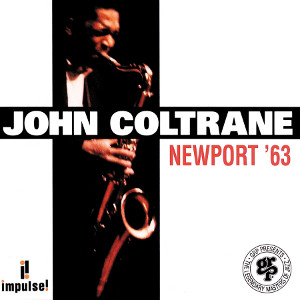
Newport '63 is a live album by jazz musician John Coltrane recorded at the 1963 Newport Jazz Festival, with one additional track recorded at the Village Vanguard in 1961. The album features the Coltrane quartet with drummer Roy Haynes substituting for Elvin Jones.

Selflessness Featuring My Favorite Things is a posthumous album by jazz musician John Coltrane, released in 1969. The album juxtaposes two tracks recorded live at the 1963 Newport Jazz Festival with a single track ("Selflessness") recorded in a studio in Los Angeles in 1965.
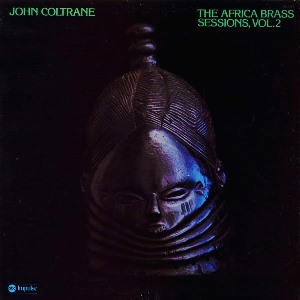
The Africa/Brass Sessions, Vol. 2 is a posthumous compilation album by American jazz saxophonist and composer John Coltrane, released in 1974 by Impulse Records. It compiles outtakes from the same 1961 sessions that produced his Africa/Brass album. "Song of the Underground Railroad" and "Greensleeves" were recorded on May 23, while "Africa" was recorded on June 4. On October 10, 1995, Impulse incorporated the tracks issued here into a two-disc set entitled The Complete Africa/Brass Sessions.
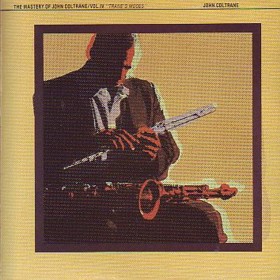
The Mastery of John Coltrane, Vol. IV: Trane's Modes is a compilation album by American saxophonist John Coltrane, released as a double LP in 1979. It features pieces recorded in 1961, two in studio and the remainder live. All the tracks were previously unissued, at the time of release. At present, "Africa " and "The Damned Don't Cry" may be found on the two-disc reissue of Africa/Brass, while all the live pieces have been included on The Complete 1961 Village Vanguard Recordings.

Dear Old Stockholm is a compilation album by jazz musician John Coltrane released by GRP and Impulse! in 1993. The music, which was recorded on April 29, 1963 and May 26, 1965 at Van Gelder Studio in Englewood Cliffs, NJ, features Coltrane's quartet with Roy Haynes substituting for Elvin Jones on drums.
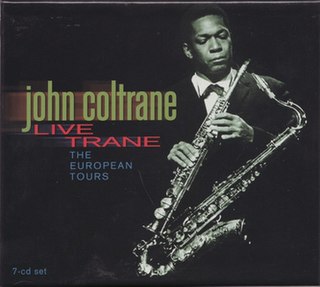
Live Trane: The European Tours is a 7–CD compilation album by American saxophonist John Coltrane containing music recorded live during 1961, 1962, and 1963 European tours, all of which took place under the auspices of Norman Granz's Jazz at the Philharmonic programs. The album, which was released in 2001 by Pablo Records, features Coltrane on tenor and soprano saxophones along with pianist McCoy Tyner, bassists Jimmy Garrison and Reggie Workman, and drummer Elvin Jones. In addition, Eric Dolphy is heard on alto saxophone, bass clarinet, and flute on a number of tracks.

So Many Things: The European Tour 1961 is a 4–CD compilation album by American saxophonist John Coltrane containing music recorded live during the 1961 European tour, which took place under the auspices of Norman Granz's Jazz at the Philharmonic programs. The album, which features Coltrane on tenor and soprano saxophones along with multi-instrumentalist Eric Dolphy, pianist McCoy Tyner, bassist Reggie Workman, and drummer Elvin Jones, was released in 2015 by Acrobat Music.
